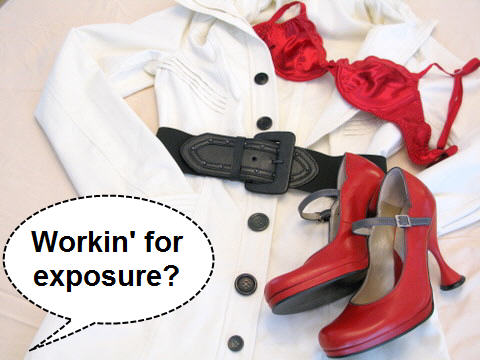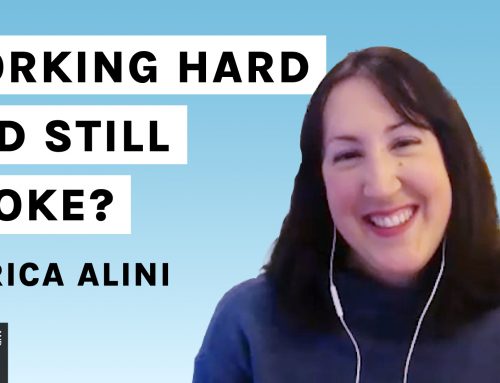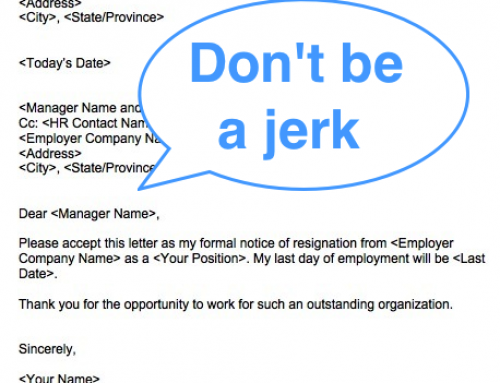Every now and then I write about work and careers on Squawkfox. You’ve got to earn money before you save it, invest it, or spend it. Go ahead and read about resumes, cover letters, and careers on this blog.
At some point in your career you may be asked to work for nothing, nadda, zilch. I have. The ask generally goes something like this:
“We love your work so we’re inviting you to join us on an exciting new project/venture/website/thing — it’s going to be huge! No compensation is involved, but the exposure could be very good.”
Exposure?
Don’t be fooled. The exposure ask isn’t just limited to writers, designers, photographers, or other creative types looking to build a buff portfolio, so beware. I’ve conversed with business analysts, programmers, PR people, childcare minders, decluttering specialists, freelancers, contractors, and self-employed small business people who are constantly asked to toil for zilch in exchange for exposure, fame, and fortune.
Excellent. But how do you eat and pay the bills with exposure? You can’t.

As a fairly creative person (with a somewhat dirty mind) I often dream up ways to earn a living by exposing oneself. Trench coats are cheap, a sexy pair of stilettos is simple to find, and a venue with enough eyeballs (like a sports stadium) could do the trick. Tattooing my book title or blog name across my a$$ could earn me some sweet exposure in the press too — for being a lunatic. I won’t build a respectable customer base with this nonsense though, so I’m taking a pass on promises of exposure. And you should too. Here’s why:
1. Exposure rarely pans out for the peon working for free. Sorry. But I’ve been that peon, and I’ve never landed a respectable gig by giving it up for nothing. The companies requesting your free services aren’t looking to hire you in the future — they’re cheap, and making moolah from your free labor is really good business for them.
2. You’ve set your hourly rate at nothing. It’s impossible to negotiate a fair wage or salary after setting your expectation for compensation at zilch. At best you’ll earn a pittance, and that’s the pits.
3. You can’t quantify exposure. I’m a mathy person and I love to crunch real data. Getting paid in real dollars is real data, and delivering a story to a client is a measurable output in my line of work. But I’ve yet to figure out how to measure fair compensation in exposure. Has the client succeeded in ‘exposure compensation’ if I get a phone call, a blog visitor, or a pat on the back? Or do I get to work free again for more exposure?
4. You can’t cash exposure. At some point you’ll need to pay the bills, feed your kids, and cover the rent. I challenge you to pay the phone bill by promising your creditor a little exposure. ‘Nuff said.
5. Your vanity is being stroked. It feels pretty good when someone with credentials and the appearance of power offers you a potential career-boosting shot, right? Get over yourself. Being invited into a ‘special arrangement’ with a select list of professionals is marketing speak designed to part you from your talent for nothing. If you’re worth being placed on a special list, then you’re worth being paid. Kudos.
6. Consider the company. Whenever a legitimate business asks me for a freebie, I consult this Should I work for free? visual guide by illustrator Jessica Hische. Not only is the gal hilarious, but she’s right on target. Take this gem:
“Just because a business isn’t profitable, that doesn’t make them a non-profit.”
And this one:
“The word ‘start-up’ is used pretty loosely by businesses to get you to charge them less.”
I’m often fed a line about limited budgets from big profitable companies, but I’m rarely asked to work for free by small business people like myself. Fellow freelancers and honest professionals know the score, and we pay each other in cash when the job gets done. You should expect the same.
Maybe work for free
I’m not backtracking here, but I do think there are a few instances when busting your butt for nothing is OK. But there are rules, people.
1. Your family and friends. I’ve got a small family and a few very close friends, so when they ask me for a little lovin’ I’m giving it up freely. But be wary if you’re related to a group of freeloaders constantly looking for time-consuming handouts and pulling emotional strings — you need to pay the bills too.
2. Student Internships. Learning the ropes for little to no pay can give a student a lot of value — especially if the line of work turns out to be a dud. Save yourself from entering (or switching to) a miserable career by doing a very short ‘knowledge collecting’ internship. A week or two should be enough time — anything longer term is unpaid labor and you could be taken advantage of by an employer who should be paying you.
3. Volunteering, Charity. Working without pay for a charity or non-profit can be a rewarding experience when the cause is near to your heart — sometimes. Be smart about it though. Check your country, state, or province’s registered charity listings to confirm whether an organization legitimately needs your help or if you’re being taken for an unpaid ride. Most charities have budgets, you know.
4. A ‘Try Out’ gig. If you want to play ball and you’ve never been on an official team, chances are you’ll need to ‘try out’ with the other no-names to make a pitch. I once got suited up for a ‘try out’ gig when I applied for a student public relations job without a portfolio.
Since I had never written a press release, I needed to prove to my prospective employer that I had the skills to get the job done. So I wrote a series of press releases for free. I had a caveat though — if the boss liked what she saw, then I’d land the student position with fair compensation.
Don’t get taken advantage of when doing a ‘try out’ gig for free. Know what you want (and need) from the freebie gig to make a payment deal. Writing a few free press releases cost me a night’s work, and I landed the job by showing the boss I could deliver the goods. Keeping my free work to a single and small task kept things professional, and I ultimately got paid for my efforts.
5. Your own blog, website, or thing. Giving away the goods via your website, blog, or some other thing is allowed. I do this here on Squawkfox because it’s where I get my jollies and no corporation is making money off my efforts. In fact, your own blog/website/thing could serve as the perfect portfolio showcasing your work/skill/talent and land you paid work. How do you think I landed my book 397 Ways To Save Money? HarperCollins Canada read my blog and offered me the job.
Most days I would rather have cash over cachet, and exposure. How about you?
Question: Under what circumstances would you work for free?





At the risk of being jumped on by people with no sense of humor, I couldn’t help but note that the first 5-6 points in your “why not to work for free” could easily be applied to a “girlfriend versus wife” discussion.
More seriously, I agree with most of your points. Working for free has never been something that sat well with me. Mostly because I *always* have other things to do than what somebody else wants, and if they want/need it badly enough they will find a way to pay for my time. Which isn’t to say I haven’t worked in advance for a payout later or worked for less than my normal rate in anticipation of compensation getting better in the future. But “free” just never feels right.
Interesting post. Sounds like good advice. At the end of your post, I believe you meant “cachet” rather than “cache”. Feel free to delete my comment after making the fix.
@Michael Thanks for the edit. Your comment stays. Maybe I should hire an editor. 😉
It might be worth it to work for free for a time if you are changing careers. Sort of a cross between a Student Internship and a Try It Out Gig, working for a week or two in a new industry might give you the opportunity to see if you really want to make a major change and give you a little training, too. Of course, pre-set limits and agreements would be important in this case, too.
Nice pic, but you forgot the grapefruits. 😉
I volunteer my time for the MS Society and sit on another not-for-profit board. I think this is valuable to both organizations (I hope!), certainly more than my measly $100 donations would be.
I have heard of people in sports marketing or maybe in the fashion industry getting ahead after an unpaid internship, but I wouldn’t recommend going down that road. Most places just abuse the intern with gopher tasks and move onto the next one after you’re burnt out.
Some people just want to get a foot in the door, and if it’s something they love than you can’t really blame them. They might be better off working in the mail room at their dream company and working their way up, rather than going the intern route.
@Mike I no longer expose my grapefruits for free. 😐
For those seeking the grapefruit pic: How to be a woman
I have a 100 hour internship after I graduate culinary school and although I am not looking forward to not being paid . . . I realize there is a HUGE value to me learning how to work in a kitchen even though I plan to end up in a kitchen for my actual career.
I like how you spelled this out because, when you think about it, there are a lot of people out there trying to get free labour out of us all the time.
As you pointed out, there are definitely exceptions to this rule but I’m definitely going to be keeping this article in mind while making decisions on when and how much to work for free.
@Val: I think a short internship, in your field, directly after you graduate, should probably be considered an extension of your schoolwork.
Somebody, next year, asking you to cook for their weekend event of 200 people “for the experience” is asking you to work for free.
IMHO.
Hilarious! Obviously tongue in cheek (but then again…) I have posted it on my fridge to review – once I have finished my “volunteer” commitments…
I couldn’t agree more. Many years ago I heard a presentation on negotiating tactics by Roger Dawson. He called this activity the “call-girl syndrome”. In the Call-Girl Syndrome the perceived value of a service rapidly diminshes immediately after the service is provided. So if you give away your service and try to build value afterward it is an up-hill climb.
This flowchart might help: http://shouldiworkforfree.com/clean.html
@Drew I already included that flowchart in the post. LOL!
I’m an electrician and often work at jobs until 3:05 or 3:10 when quitting time is 3:00. It just doesn’t seem right to drop the tools in the middle of putting up a light. I don’t get paid for that time, so I guess I’m working for free. If the job takes a couple weeks, this could add up to an hour or more. So …… should I quit doing this, or is it one of the OK cases?
@Fox, another freeby edit, that’s “flowchart”, not “flowcart”. (Though flowcart does sound like a very real entity.)
I worked as an orchestral musician in a Canadian orchestra for over twenty years. You would not believe the number of times that the musicians in professional orchestras are asked to donate their services – again, often under the heading of “exposure.” More often the reality is “forced volunteerism!”
If my mechanic, veterinarian, accountant,etc. were willing to give me their services for free, I would seriously consider doing the same for them. Unfortunately, most of us have financial obligations in the form of car loans and mortgages. The banks don’t seem too interested in offering money for free. (Oddly enough, sometimes they don’t have a problem asking musicians to work for free….)
Enough said.
A.
Like Andrew, I used to be a musician. Played in an Old Time String Band; you know, square dances and weddings and stuff like that. Every (profitable) charity you can imagine from churches to United Way used to give us the “exposure” pitch. Our fiddler would look at them with a quizzical look and say, “People die from exposure, don’t they?”
“Under what circumstances would I work for free?” I actually asked myself that question a few months back because I am in the planning stage of a new business and I have no funding source. My plan is fully bootstrappable. However, about 6 months into the launch, I will need employees. I do not want give away partnerships for the obvious reasons. I don’t want to give away stock because I want to maintain control. So, I asked myself that question and here is my answer. I would work for IOUs that function like a return on an investment. A typical angel investor expects to get 5 times his money back in 3 or 4 years. An acceptable IOU would be based on a reasonable hourly rate times the total number of hours I would have worked over whatever time-span it took for the business to become profitable times 5. I would in fact be an angel investor and I would look at the proposition carefully. Like any angel investor, I would be willing to take a reasonable risk, but I would need plenty of evidence regarding the soundness of the business plan. Here is what someone might expect. The skill, experience, and talent of the employee I will need could bring $21 per hour in the marketplace. If that person accepted my deal and it took 5000 work hours on average for the business to reach the IOU cash-out point, that person would have earned $105,000 in IOUs. Times 5, the ROI would be a cool half-million dollars. Fox, what do you thing?
Customers who want free work are not customers. They have no respect for my time and I am training them that this is OK. It isn’t. Time I spend working for free for people who will never value me is much better spent looking for decent people who will pay me.
[…] according to the LA Times, all in the hopes of one day landing jobs that pay actual salaries. A SquawkFox post mostly argues against the idea of accepting a no-pay internship and working for free, for reasons […]
The flowchart is awesome. I shared it with everybody in my office.
On a more serious note, I think it’s important to evaluate what you’re going to get out of working for free.
When I first started off as a Financial Advisor in NYC, I was not paid a salary. It was and remains to this day 100% commission based. It is essentially like starting your own business. If I hadn’t of started at a good firm, I wouldn’t of stayed at all.
[…] from Squawkbox says you should never work for free. Maybe. Or maybe not. Go check out the post to […]
The time and energy spent looking for a job is working for free. In fact these days it can be full time job in itself.
I would only advise working for free when you’re young (18-22) and don’t have a career. It could be a good way to get your foot in the door.
Stephen, I could answer your question.. what your saying is really fraud. You or your company cannot hand over a IOU with the so=called promise that someone will get back 5 times their imput as a “employee”.
On a broader note, Canada has more non profits then corps. As such it is a really big mistake for anyone to work for free as this could lower the unemployment rate in canada as a whole. Please don’t claim that it helps people, as I would put it back to you as…how?
Walter, I have confused you. I apologize. Even though I used the word employee in the above description, I do not intend to ever hire employees. This new business will be build with contracted talent. What I attempted to describe was talented people investing their time and expertise exactly the same way, and for the same purpose, and for the same reward as an angel investor would invest capital. In my proposal, the talent I need would be investing personally held human capital. I have made great progress since I commented here last. I am just weeks away from seeing if this proposal will really work. If you or anyone is interested in a follow-up I invite your to email me – stephentyler5 (using the typical format) cox.net
I don’t know if anybody is still reading this thread, but I have thought a lot about this topic over the last few months. I think the commenters here prove conclusively that very few people are so convinced of their purpose in life and so passionate in the pursuit of that purpose as to be willing to risk everything in order to achieve and succeed in that purpose. By way of creating a distinct contrast between exceptional and ordinary, let me tell you the story of Kevin Liles. Liles wanted to get into the recording business. One day he walked into the offices of Def Jam Records and asked if there was anything he could do to help out. He didn’t want a job. He just wanted to be around talented recording engineers. He kept coming back every day until they gave him something to do. And then he came every day just like any other employee, only he worked for free. His boss said of him, “He worked harder than anyone in the company, always had a smile on this face, and never once mentioned money. Not once.” Liles became so indispensable they eventually gave him a real job. Within 8 years he was president of Def Jam. Today he is Executive VP of Warner Music.
Conserve today, reap the rewards tomorrow. When you save today, you build up defenses to financial destruction.
My comment above seems to be out of place, I must have been thinking of a different post. As to the topic of this article, don’t work for free, I can really relate to the issue. As a lawyer, it seems that I constantly have people asking for free legal advice. I usually don’t mind because I enjoy helping people, it is just that it can get old when the same friends always expect free legal work. Thanks for the post, helps me feel like I am not the only one that feels this way.
unless you are a wealthy hobbyist, trust funder, low self esteemer…..who would work for free? The amateurs make it difficult for professionals.
watch harlan ellisons pay the writer video on you tube.
is rent free, schooling, utilities, petrol? do they get paid? their boss collect.a paycheck?.
do electricians, podiatrists, hoteliers, gardeners work for the exposure BS. ask a carpenter to build an additio for free….youll take pictures for that oh so great exposure schtick and see what.they say.
I dont take a piss unless Im getting paid for it. When you.pick my brain, you pick my pockets.
It took me over 24yrs to earn this knowledge, experience,.etc…I will not give it away for Free to for profit moochers,.freebie seekers, and.other jokers who.wouldnt go 5sec without getting paid.
BS.
Who works for free? Suckers? Chumps? Lackies? Sheeple?
Barry, apparently you didn’t bother to read my comments here. I suggest you google the name Kevin Liles. Read his story and ask yourself if he was a sucker, chump, lackey, sheeple. There are thousands of stories illustrating this pathway to success. With your overwrought imagination of your worth in the marketplace, I would not invest my money in your future.
When you pick my brain, you pick my pockets. Sick of all these moochers asking for free chats, free this, free consulting, etc…everyone is getting paid, the AV guy, the venue, the food, etc..but no the programme content. Barry’s spot on. IF you work for free, you are a sucker and indeed, a chump. This namby pamby work for free nonsense sounds like some trust funder/inheritancer rattle. No pay, no work. Cannot eat exposure, cannot pay my petrol on that amazing credit. Listen to Harlan Ellison–pay the writer–spot on cheapies/moochers.
I own a one women Barber shop..I am asked this alot. …”I don’t get paid till next week can I have a hair and pay you next week?”. ….yum. no! come back when you got the cash. I have rent, utilities, products, equipment to maintain, my clippers cost $400 the replacement blades are $70…..I can not give a iou to purchase anything. By no means am I rich. People like that are broke because they can not manage their money..I can work for free not a charity. Do not ask for me a discount either. Seriously, I be out of business. You can’t go to Wal Mart and get a gallon of milk and not pay or pay half price because you don’t think it is fair..When I moved my shop to a new location. ….not one person who got a free hair cut helped me out….free hair cuts for years. Had to pay movers. No one is getting anything free in my shop.